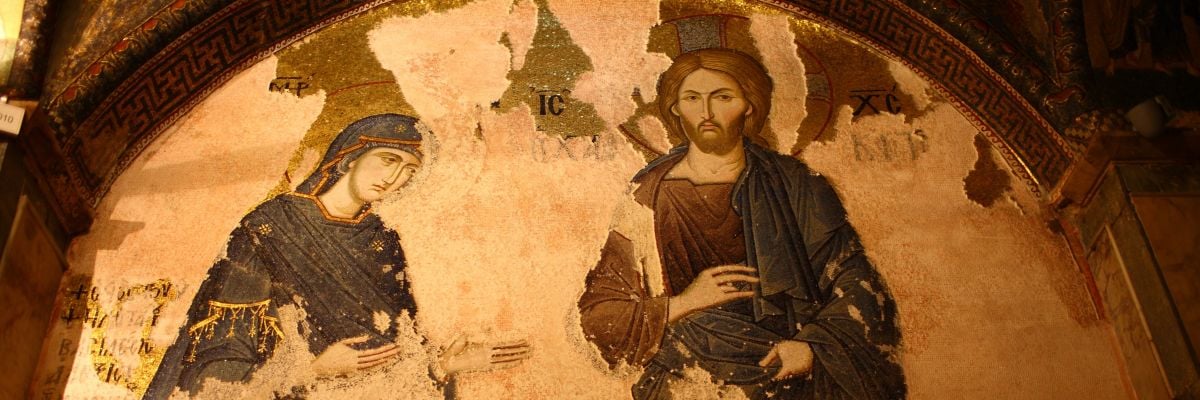Was the Early Church ‘Catholic’ or Just ‘Christian’?
Protestants often claim that the Church that Jesus founded was the “Christian Church,” not the Catholic Church. Let's see what history says.

www.catholic.com
Protestants often claim that the Church that Jesus founded was the “Christian Church,” not the Catholic Church. The biblical evidence cited for this claim is found in the Acts of the Apostles: “So Barnabas went to Tarsus to look for Saul; and when he had found him, he brought him to Antioch. For a whole year they met with the church, and taught a large company of people; and in Antioch the disciples were for the first time called Christians” (Acts 11:25-26).
Many modern Christians then suppose that the Catholic Church was founded by mere men much later in Christian history.
No doubt, disciples in the early Church became known as
Christians. But does this mean that their Church was not the Catholic Church? A little historical study into the church at Antioch reveals that these early Christians’ church was, indeed, the Catholic Church.
One of the things Peter did before he went to Rome was to found the church in Antioch, the third largest city in the Roman Empire at the time. He ordained a disciple there named Evodius to the episcopacy and appointed him the bishop of Antioch. Evodius is believed by many to have been one of the seventy disciples Jesus appointed to go ahead of him to the towns and places where he taught during his second missionary journey (see Luke 10:1). It was during Evodius’s reign as bishop of Antioch that the disciples there were for the first time called Christians. But this isn’t the end of the story!
While Paul was teaching the Christians in Antioch during Evodius’s reign, another young disciple was moving up through the ranks. His name was Ignatius, and he would later become known as Saint Ignatius of Antioch, an early Christian martyr. Ignatius was a disciple of John. Legend has it that, much earlier in his life, Ignatius was the child whom Jesus took in his arms in a passage recorded by Mark:
[Jesus] sat down and called the twelve; and he said to them, “If any one would be first, he must be last of all and servant of all.” And he took a child, and put him in the midst of them; and taking him in his arms, he said to them, “Whoever receives one such child in my name receives me; and whoever receives me, receives not me but him who sent me.” (Mark 11:35-37)
This legend demonstrates the great esteem his memory has enjoyed since the early centuries of the Church.
At Antioch, Ignatius was ordained by Paul, and then, at the end of the reign of Evodius, he was appointed bishop of Antioch by Peter. He reigned there for many years before his martyrdom in Rome. On his way to Rome to be martyred, he wrote several letters to fellow Christians in various locations, expounding on Christian theology. He especially emphasized unity among Christians (see John 17) and became known as an Apostolic Father of the Church.
In one of his letters (to Christians in Smyrna), he wrote, “Where there is Christ Jesus, there is the Catholic Church.” This is the earliest known written record of the term “Catholic Church” (written around A.D. 107), but Ignatius seemingly used it with the presumption that the Christians of his day were quite familiar with it. In other words, even though his is the earliest known written record of the term, the term likely had been in use for quite some time by then, dating back to the time of the apostles.
The term “Catholic Church” (Gk. katholike ekklesia) broadly means “universal assembly,” and Ignatius used it when writing to the Christians of Smyrna as a term of unity. He exhorted these Christians to follow their bishop just as the broader universal assembly of Christians follows Christ. He clearly uses the terms “Christian” and “Catholic Church” distinctly: disciples of Christ are Christians; the universal assembly of Christians is the Catholic Church.
Some might claim that Ignatius intended to use the term “Catholic Church” not as a proper name for the Church, but only as a general reference to the larger assembly of Christians. If so, then the universal assembly had no proper name yet, but “Catholic Church” continued in use until it became the proper name of the one church that Christ built on Peter and his successors.
Thus, we see that the Christians of Antioch were part of the Catholic Church. They were indeed
Christian disciples, but they were also
Catholic. Given the unbroken chain of succession at Antioch—from Peter (sent by Christ) to Evodius to Ignatius—if any Christian today wishes to identify with the biblical Christians of the first century mentioned in Acts 11, it follows quite logically that he must also identify with those same Christians’ universal assembly: the Catholic Church.


